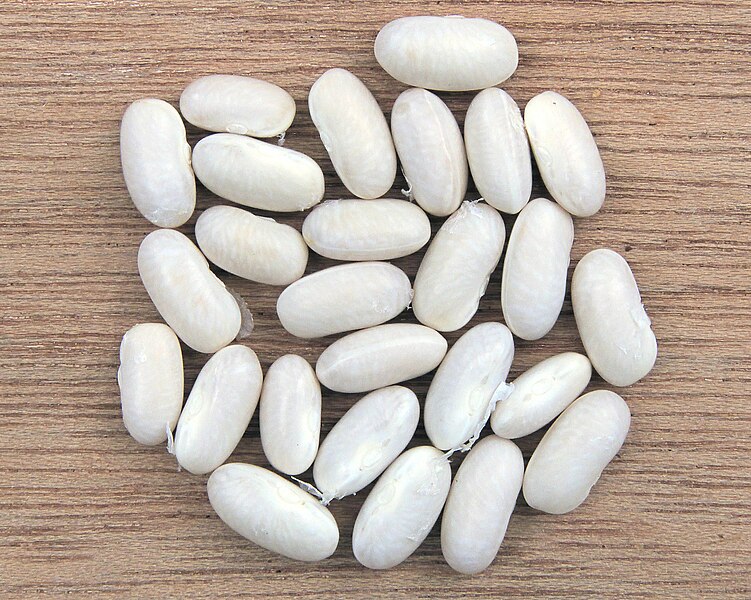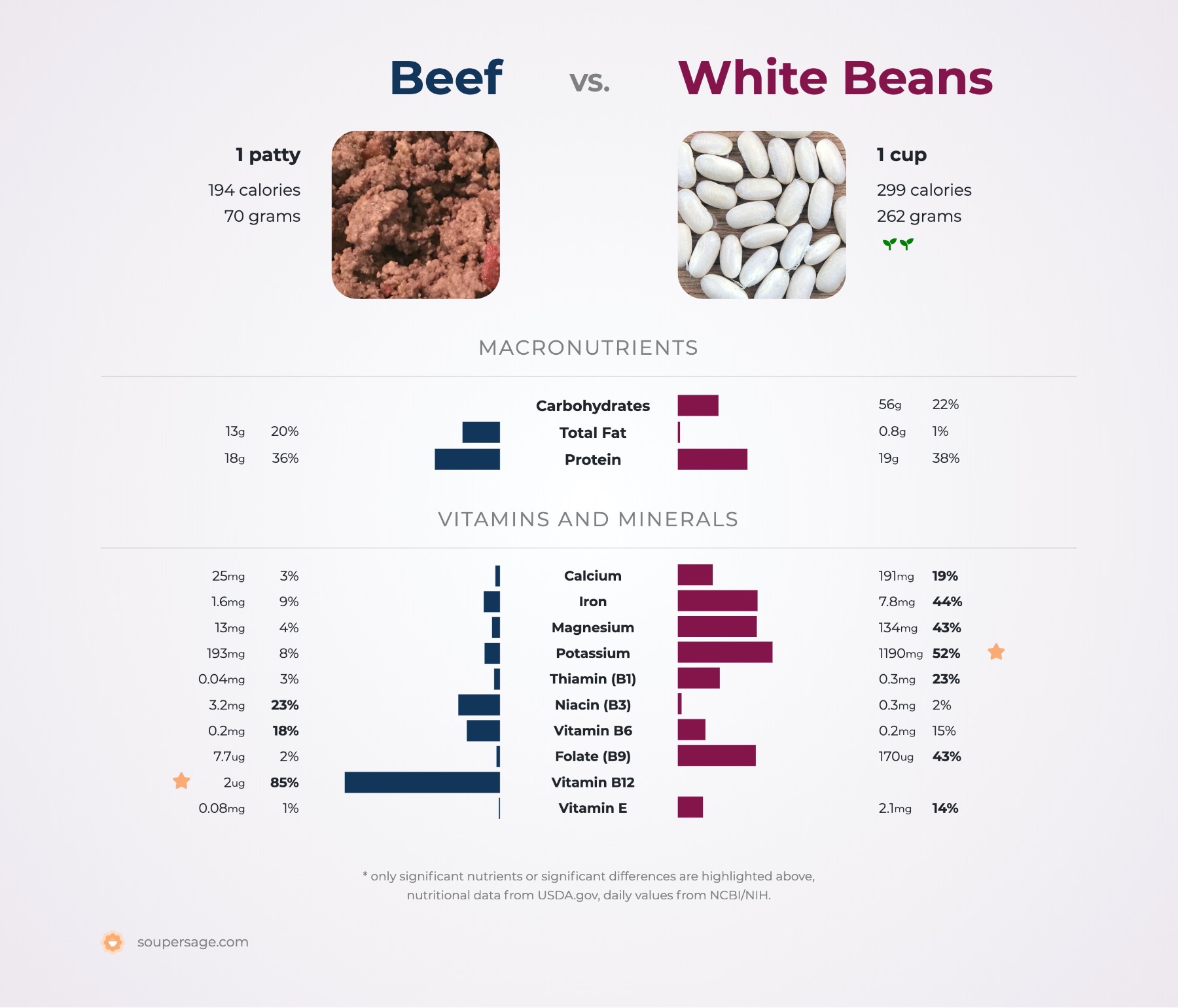Beef vs. White Beans
Nutrition comparison of Cooked Beef and White Beans
Ever wonder how your favorite foods stack up against each other in terms of nutrition?
We compared the nutritional contents of
cooked
beef
versus
white beans
(100g each)
below using 2020 USDA and NIH data[1].
For a quick recap of significant nutrients and differences in beef and white beans:
- Both beef and white beans are high in calories, iron and potassium.
- Beef has more riboflavin, niacin, pantothenic acid, Vitamin B6 and Vitamin B12, however, white bean contains more folate.
- Beef has signficantly less carbohydrates than white bean.
- Beef is an excellent source of protein.
- White bean is an excellent source of calcium and dietary fiber.
USDA sources for nutritional information: Beef (Beef, ground, 70% lean meat / 30% fat, patty, cooked, broiled) and White Beans (Beans, white, mature seeds, canned) . Have a correction or suggestions? Shoot us an email.
Calories and Carbs
calories
Both beef and white beans are high in calories. Beef has 143% more calories than white bean - beef has 277 calories per 100 grams and white bean has 114 calories.
For macronutrient ratios, beef is heavier in protein, much lighter in carbs and much heavier in fat compared to white beans per calorie. Beef has a macronutrient ratio of 38:0:62 and for white beans, 25:73:2 for protein, carbohydrates and fat from calories.
Macro Ratios from Calories:
| Beef | White Beans | |
|---|---|---|
| Protein | 38% | 25% |
| Carbohydrates | ~ | 73% |
| Fat | 62% | 2% |
| Alcohol | ~ | ~ |
carbohydrates
Beef has signficantly less carbohydrates than white bean - white bean has 21.2g of total carbs per 100 grams and beef does not contain significant amounts.
dietary fiber
White bean is an excellent source of dietary fiber and it has more dietary fiber than beef - white bean has 4.8g of dietary fiber per 100 grams and beef does not contain significant amounts.
sugar
White beans and beef contain similar amounts of sugar - white bean has 0.29g of sugar per 100 grams and beef does not contain significant amounts.
Protein
protein
Beef is an excellent source of protein and it has 250% more protein than white bean - beef has 25.4g of protein per 100 grams and white bean has 7.3g of protein.
Fat
saturated fat
Beef is high in saturated fat and white bean has 99% less saturated fat than beef - beef has 7.3g of saturated fat per 100 grams and white bean has 0.07g of saturated fat.
trans fat
White bean has less trans fat than beef - beef has 1.2g of trans fat per 100 grams and white bean does not contain significant amounts.
cholesterol
White bean has less cholesterol than beef - beef has 88mg of cholesterol per 100 grams and white bean does not contain significant amounts.
Vitamins
Vitamin A
Beef and white beans contain similar amounts of Vitamin A - beef has 3ug of Vitamin A per 100 grams and white bean does not contain significant amounts.
Vitamin D
Beef and white beans contain similar amounts of Vitamin D - beef has 2iu of Vitamin D per 100 grams and white bean does not contain significant amounts.
Vitamin E
Beef and white beans contain similar amounts of Vitamin E - beef has 0.12mg of Vitamin E per 100 grams and white bean has 0.79mg of Vitamin E.
Vitamin K
Beef and white beans contain similar amounts of Vitamin K - beef has 3ug of Vitamin K per 100 grams and white bean has 2.9ug of Vitamin K.
The B Vitamins
Beef has more riboflavin, niacin, pantothenic acid, Vitamin B6 and Vitamin B12, however, white bean contains more folate. Both beef and white beans contain significant amounts of thiamin.
| Beef | White Beans | |
|---|---|---|
| Thiamin | 0.051 MG | 0.096 MG |
| Riboflavin | 0.176 MG | 0.037 MG |
| Niacin | 4.537 MG | 0.113 MG |
| Pantothenic acid | 0.658 MG | 0.185 MG |
| Vitamin B6 | 0.336 MG | 0.075 MG |
| Folate | 11 UG | 65 UG |
| Vitamin B12 | 2.9 UG | ~ |
Minerals
calcium
White bean is an excellent source of calcium and it has 109% more calcium than beef - beef has 35mg of calcium per 100 grams and white bean has 73mg of calcium.
iron
Both beef and white beans are high in iron. White bean has 33% more iron than beef - beef has 2.3mg of iron per 100 grams and white bean has 3mg of iron.
potassium
Both beef and white beans are high in potassium. White bean has 65% more potassium than beef - beef has 275mg of potassium per 100 grams and white bean has 454mg of potassium.
Omega-3 and Omega-6
omega 3s
For omega-3 fatty acids, both beef and white beans contain significant amounts of alpha linoleic acid (ALA).
| Beef | White Beans | |
|---|---|---|
| alpha linoleic acid | 0.056 G | 0.056 G |
| Total | 0.056 G | 0.056 G |
omega 6s
Comparing omega-6 fatty acids, beef has more linoleic acid than white bean per 100 grams.
| Beef | White Beans | |
|---|---|---|
| other omega 6 | 0.012 G | ~ |
| linoleic acid | 0.39 G | 0.067 G |
| Total | 0.402 G | 0.067 G |
Customize your serving size
The comparison below is by weight, but sometimes 100g isn't that intuitive of a measurement for food. View a custom portion comparison (e.g. cups, oz, package).
You can try adding or subtracting the amount of either Beef or White Beans .
Note: The specific food items compared are: Beef (Beef, ground, 70% lean meat / 30% fat, patty, cooked, broiled) and White Beans (Beans, white, mature seeds, canned) .
Cooked Beef g
()
|
Daily Values (%) |
White Beans g
()
|
|||||
|---|---|---|---|---|---|---|---|
| KCAL % |
|
5% | calories | 5% |
|
KCAL % | |
| G % |
|
5% | carbohydrates | 5% |
|
G % | |
| G % |
|
5% | dietary fiber | 5% |
|
G % | |
| G | 5% | sugar | 5% | G | |||
| G % |
|
5% | total fat | 5% |
|
G % | |
| G % |
|
5% | saturated fat | 5% |
|
G % | |
| G | 5% | monounsaturated fat | 5% | G | |||
| G | 5% | polyunsaturated fat | 5% | G | |||
| G | 5% | trans fat | 5% | G | |||
| MG | 5% | cholesterol | 5% | MG | |||
| MG % |
|
5% | sodium | 5% |
|
MG % | |
| 5% | Vitamins and Minerals | 5% | |||||
| UG % |
|
5% | Vitamin A | 5% |
|
UG % | |
| MG % |
|
5% | Vitamin C | 5% |
|
MG % | |
| IU % |
|
5% | Vitamin D | 5% |
|
IU % | |
| MG % |
|
5% | calcium | 5% |
|
MG % | |
| MG % |
|
5% | iron | 5% |
|
MG % | |
| MG % |
|
5% | magnesium | 5% |
|
MG % | |
| MG % |
|
5% | potassium | 5% |
|
MG % | |
| MG % |
|
5% | thiamin (Vit B1) | 5% |
|
MG % | |
| MG % |
|
5% | riboflavin (Vit B2) | 5% |
|
MG % | |
| MG % |
|
5% | niacin (Vit B3) | 5% |
|
MG % | |
| MG % |
|
5% | Vitamin B6 | 5% |
|
MG % | |
| MG % |
|
5% | pantothenic acid (Vit B5) | 5% |
|
MG % | |
| UG % |
|
5% | folate (Vit B9) | 5% |
|
UG % | |
| UG % |
|
5% | Vitamin B12 | 5% |
|
UG % | |
| MG % |
|
5% | Vitamin E | 5% |
|
MG % | |
| UG % |
|
5% | Vitamin K | 5% |
|
UG % | |
| G % |
|
5% | protein | 5% |
|
G % | |
| UG % |
|
5% | biotin (Vit B7) | 5% |
|
UG % | |
| MG % |
|
5% | choline | 5% |
|
MG % | |
| MG % |
|
5% | chlorine | 5% |
|
MG % | |
| UG % |
|
5% | chromium | 5% |
|
UG % | |
| MG % |
|
5% | copper | 5% |
|
MG % | |
| UG % |
|
5% | fluoride | 5% |
|
UG % | |
| UG % |
|
5% | iodine | 5% |
|
UG % | |
| MG % |
|
5% | manganese | 5% |
|
MG % | |
| UG % |
|
5% | molybdenum | 5% |
|
UG % | |
| MG % |
|
5% | phosphorus | 5% |
|
MG % | |
| UG % |
|
5% | selenium | 5% |
|
UG % | |
| MG % |
|
5% | zinc | 5% |
|
MG % | |
| G | 5% | Water | 5% | G | |||
| G | 5% | Starch | 5% | G | |||
| G | 5% | Alcohol | 5% | G | |||
FAQ
Does beef or white beans contain more calories in 100 grams?Both beef and white beans are high in calories. Beef has 140% more calories than white bean - beef has 277 calories in 100g and white bean has 114 calories.
Is beef or white beans better for protein?
Beef is a fantastic source of protein and it has 250% more protein than white bean - beef has 25.4g of protein per 100 grams and white bean has 7.3g of protein.
Does white beans or beef have more carbohydrates?
By weight, beef has signficantly fewer carbohydrates than white bean - white bean has 21.2g of carbs for 100g and beef has no carbs..
Does beef or white beans contain more calcium?
White bean is a rich source of calcium and it has 110% more calcium than beef - beef has 35mg of calcium in 100 grams and white bean has 73mg of calcium.
Does beef or white beans contain more iron?
Both beef and white beans are high in iron. White bean has 30% more iron than beef - beef has 2.3mg of iron in 100 grams and white bean has 3mg of iron.
Does beef or white beans contain more potassium?
Both beef and white beans are high in potassium. White bean has 70% more potassium than beef - beef has 275mg of potassium in 100 grams and white bean has 454mg of potassium.


